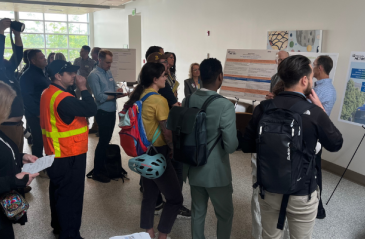
The information barriers holding back climate action and how to break them

Technology gives policymakers the opportunity to design better policies and reduce red tape
Share articleThe use of new data sources is still in an exploratory phase when it comes to policymaking
Share articleBig data is not the panacea for all governmental woes
Share articleWe put our vision for government into practice through learning partner projects that align with our values and help reimagine government so that it works for everyone.
Government is changing. Technology is rippling across ministries, transforming policymaking in ways large and small. New data sources, data linking, and cutting-edge analytical and visualisation tools offer just one dimension. Today's generation of government leaders can also call on real-time policy monitoring and digital phenomena such as the online political engagement of citizens.
These new approaches - far beyond the reach of previous governments - offer policymakers the opportunity to design better policies and well-targeted regulation, pursue efficiency gains, lower administrative burdens, and strengthen policy enforcement and feedback loops. Local and regional policymakers are leading the way under the header of Smart Cities. These initiatives can be assessed for their potential for scaling up and replication at national and international level.
An important starting point is to understand how data analysis - and its results - can be incorporated into the actual decision-making process. This is the main topic of a study that we are conducting for the European Commission.
Despite the advances of recent years, the use of new data sources - such as social media, web-crawling and sensor data - is still in an exploratory phase when it comes to policymaking. This means that a clear priority is to develop the skills needed to analyse and interpret data. Civil servants must now be able to translate the results, and the uncertainties, into policy recommendations. It requires a new and distinct skill set to understand the context, ‘read' these models to interpret the data science, and draw conclusions for the policymakers. However, although there remains a need for caution and transparency, several opportunities to improve decision-making, and therefore the impact of policies, are already becoming a reality.
Technology is now a commodity. Sensors, connectivity, cloud computing, database software and visualisation tools are well established within the policymaking process. There is also an abundance of data. Public bodies, at national and international level, are increasingly embracing open data, in particular, to strengthen accountability and enhance transparency for their citizens. Data hubs - a collection of data from multiple sources organised for distribution - are also becoming more common, and this is reducing the gap between data availability and data use.
But more can be done. For example, in order to increase the adoption of data-driven approaches - including automatic or ‘machine' data generation and analysis - they should be combined with established approaches that rely on ‘human' data generation and analysis. Success stories also need to be more widely shared. A stronger partnership between academia and government could help, too: structural collaboration would generate a long-term basis for the sustainable use of big data for policymaking.
Yet before we assume that big data is the panacea for all governmental woes, it is wise to inject a note of caution. It can be used and abused, much as statistics can lie. Even in experiments, one should be careful and transparent in selecting indicators, data sources, data analytics and visualisation tools. Similarly, because big data is suddenly so popular, there is a risk that ambitious initiatives over-promise and come at the expense of data quality and integrity, which could weaken the validity of the analysis.
A related challenge is that failed experiments and implementations lead to a lack of trust in using big data for policymaking. Too many risks and failures can delay the full benefits from being realised. Partly, this is rooted in the wider issue that standards for big data are currently defined very broadly - from terminology to privacy requirements. There remains an urgent need for international (non-binding) standards to be finalised, and the data science community has an important role to play in the context of trust, ethics and standards. It needs to take up its responsibilities in carrying out big data analyses, and ensure that professional ethics are applied to the collection and use of big data.
Achieving these targets will make the use of big data in government sustainable and even more widespread than it is today. We're just starting to show how it can help transform policymaking around the world.
Read the full report at Data4Policy.
Professor Ralph Schroeder











